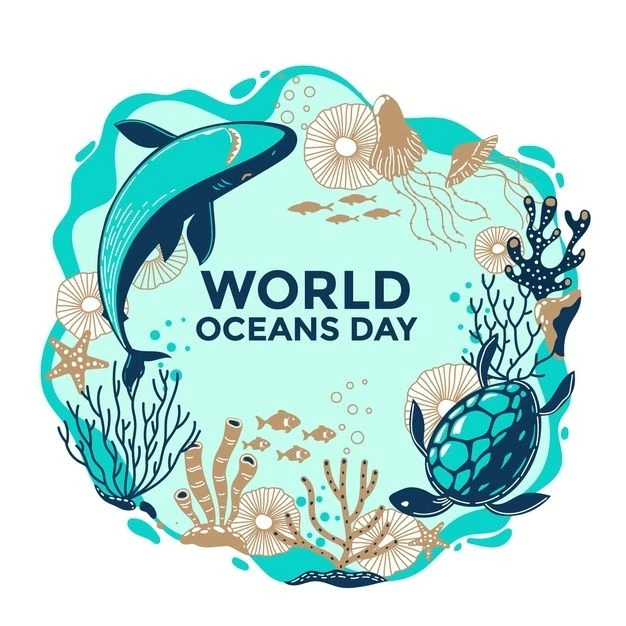
Because Our Future Depends on Healthy Oceans
Spanning over 70% of our planet’s surface, the world’s oceans are vast expanses of mystery, teeming with life and history that shape our existence in more ways than we often acknowledge. Our oceans are integral to the balance of our global ecosystem, providing us with indispensable resources while serving as natural carbon sinks that alleviate climate change. However, despite their critical importance, our oceans are under dire threat due to human activities. The United Nations designated June 8 as World Oceans Day in response to this escalating crisis. This global observance emphasizes the fundamental role oceans play in our lives and calls for collective, worldwide efforts to conserve these crucial bodies of water.
Canada first proposed World Oceans Day at the 1992 Earth Summit in Rio de Janeiro, Brazil. The Canadian International Centre for Ocean Development (ICOD) and the Ocean Institute of Canada (OIC) had been celebrating National Oceans Week as early as 1987. These initiatives ultimately culminated in a global day of ocean recognition. However, it was not until 2008 that the United Nations officially recognized June 8 as World Oceans Day, acknowledging the need for a global celebration and collaboration to conserve the world’s oceans.
The central motivation behind World Oceans Day was the pressing need to raise global awareness of the critical role of the oceans in our lives and the various ways humans are threatening marine life and ecosystems. It emphasizes the duty each one of us has to ensure the long-term sustainability of our planet’s oceans.
Each year, World Oceans Day follows a theme highlighting a specific ocean conservation aspect or challenge. For 2023, the theme is “Ocean Restoration for a Sustainable Future”. This theme emphasizes the urgent need for large-scale restoration of marine ecosystems, focusing on initiatives that can help rejuvenate the oceans and mitigate the adverse effects of human activity, climate change, and biodiversity loss.
The significance and complexity of the world’s oceans are captured in their enormity and the profound influence they wield on life on Earth. Here are some key facts and statistics that underscore this importance and the challenges we face in ocean conservation:
- Biodiversity: Oceans are a vibrant hub of biodiversity, home to an estimated 2.2 million species. These range from the smallest microbes to the largest creature on Earth, the blue whale.
- Climate Regulation: Oceans absorb about 30% of carbon dioxide produced by humans, buffering the impacts of global warming. They also absorb 90% of the extra heat trapped by greenhouse gases in the Earth’s atmosphere.
- Livelihoods and Economy: Globally, over three billion people depend on marine and coastal biodiversity, while the fisheries industry directly or indirectly employs an estimated 200 million people. The market value of marine and coastal resources and industries is estimated at $3 trillion annually, about 5% of global GDP.
- Threats to the Oceans: Our oceans are under severe strain despite their importance. About 8 million tons of plastic waste find their way into the oceans each year, causing damage to marine life and ecosystems. Overfishing has led to the depletion of nearly 90% of the world’s significant fish populations, and destructive fishing practices have destroyed many marine habitats. Moreover, climate change-induced warming and acidification of the oceans are leading to coral bleaching, with 50% of the world’s coral reefs already lost in the last 30 years.
- Protection of Marine Areas: As of 2021, about 7.65% of the global ocean’s area is covered by protected areas. However, the UN’s Sustainable Development Goal 14 aims to conserve at least 10% of coastal and marine areas by 2020.
Thus, in the face of grim statistics and escalating environmental crises, the annual celebration of World Oceans Day serves as a beacon of hope and a call to action. The need for expansive, comprehensive ocean conservation and restoration efforts becomes increasingly apparent as we look towards the future.
The Food and Agriculture Organization estimates that 34.2% of the world’s fish stocks are fished at biologically unsustainable levels. This statistic is particularly alarming, considering that in 1974 this figure stood at just 10%, revealing the relentless pressure we have been placing on our oceans and marine life. To ensure the sustainability of fisheries and aquaculture, we must promote more responsible fishing practices and eliminate illegal, unreported, and unregulated (IUU) fishing.
A significant challenge to ocean health is marine pollution, predominantly in the form of plastic waste. If current trends continue, our oceans could contain more plastic than fish by weight as early as 2050. Preventing this grim prediction from becoming a reality requires comprehensive waste management reform, cutting-edge research into eco-friendly materials, and public education on reducing, reusing, and recycling.
On the flip side, the economic benefits of preserving our oceans are immense. According to a study by the World Wildlife Fund, our oceans’ total economic value is around $24 trillion. Compared to the world’s top economies, the ocean ranks seventh-largest. Sustainable marine practices, therefore, not only benefit our environment but also present significant economic potential.
Recent studies indicate that protecting at least 30% of our global oceans by 2030 (30×30) could provide many benefits, including safeguarding biodiversity, enhancing fish catches, and helping mitigate climate change impacts. Around 7.65% of our oceans are protected, but efforts are underway to reach this ambitious 30×30 target.
In closing, as we commemorate World Oceans Day 2023, let us remember that our actions today will determine the health of our oceans tomorrow. The sustainability of our oceans is not just an environmental issue; it is an economic imperative and a social justice issue. Let’s strive for a world where our oceans are valued, protected, and treasured for generations.


